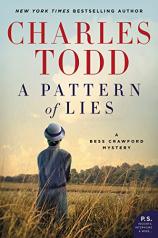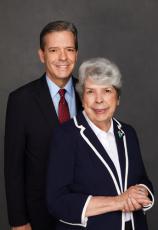Reading Group Guide
Discussion Questions
A Pattern of Lies: A Bess Crawford Mystery

1. Why did Mark Ashton not tell Bess the whole story about the explosion and the recent attacks on Abbey Hall and his family, before she committed herself to visit there? Do you think that was fair? Would Bess have gone there anyway? Why does Bess spend her limited time in England trying to help the Ashtons instead of visiting her own family?
2. Philip Ashton makes no effort to defend himself when he’s taken into custody. How does this affect the perception of his guilt? Was it pride --- or arrogance on his part?
3. Mrs. Ashton confides in Bess in much the same way that she might have confided in Ellie, who would have been her daughter-in-law. Why do you think this was? What did she see in Bess that she doesn’t find in Clara?
4. Sergeant Lassiter is a frequent visitor to the series. What does his “grapevine” tell you about the bonds between soldiers at the Front?
5. Bess tells Sergeant Lassiter that she hasn't given her heart to anyone. Do you think Bess might have feelings for someone that she'll feel free to express once the fighting is over?
6. Bess finds herself personally threatened several times, both in France and back in England. How is this danger different than the constant peril of being at war? How does she handle this threat to herself? What gives her the courage to go on, her training as a nurse? Her upbringing with the British Army? Or is it intrinsic in Bess herself?
7. What do you think makes Bess such a good nurse? Has reading about her work on the battlefield changed your picture of what these women did in the Great War? How do you think such service changed them? And what long term affect could it have on Bess’s life when the war ends?
8. What did you make of the German pilot who flies over Bess’s station and shoots at ambulances? Although he intentionally misses, what toll does it take on the drivers and wounded?
9. How do Bess and Mark Ashton balance their respective duties to their families, and to England and the war effort? What toll does it take on each of them to be pulled between these two loyalties?
10. Sergeant Rollins refuses to do anything to help the Ashtons, and his sister is even more adamant about seeing the family suffer. What do you think drives these two people, and others who feel the same way? Is it a question of class? Is it personal? Or were they already susceptible to quiet manipulation?
11. What do you think of the Ashtons’ new barrister, Heatherton-Scott, and his valet? Henry has his own secrets but he is quite good at finding out information as his master’s “legs”. Not much is said about Henry’s background. What do you suppose has made him so good at what he does? Do you find him intriguing?
12. What in your opinion is the difference between Corporal Britton and Captain --- now Lieutenant --- Collier? Both are killers, but they have different motivations. Do you think Collier has a conscience? His methods for convincing people to turn on the Ashtons worked. Why? Because of his skill --- or their need?
13. Does the plot resonate more with you because it is based on a true story, even though it is fictionalized here? How do you think such a loss of life affected the real village, emotionally and economically? Or the country as a whole, in the middle of a war, when gunpowder was essential to victory? Was the Army right to keep such a loss out of the press?
14. The comment is made, “What do you do, when you can’t blame God?” In disasters, natural or manmade, do people often want to blame something or someone for their suffering and loss? What role do myth and superstition play in how people make sense of a tragedy? Is it human nature to look for blame? Or is it the shocking suddenness of loss that gives people no time to prepare or to mourn?
A Pattern of Lies: A Bess Crawford Mystery
- Publication Date: April 12, 2016
- Genres: Fiction, Historical Fiction, Historical Mystery, Mystery
- Paperback: 352 pages
- Publisher: William Morrow Paperbacks
- ISBN-10: 0062386255
- ISBN-13: 9780062386250








